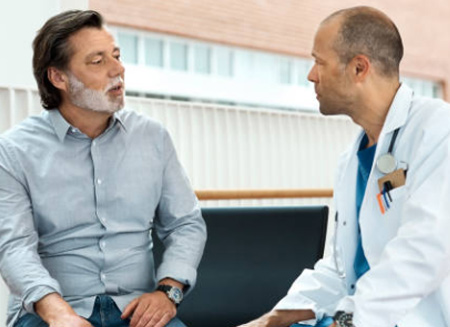Outpatient Visit
 You may be referred to a thoracic surgeon by either a respiratory physician or your GP. Your surgeon may want to meet you prior to surgery in out-patients. The purpose of that visit is for your surgeon to assess the need for surgery and the risks involved. They will discuss these with you and you will have the chance to ask any questions or discuss alternatives to surgery.
You may be referred to a thoracic surgeon by either a respiratory physician or your GP. Your surgeon may want to meet you prior to surgery in out-patients. The purpose of that visit is for your surgeon to assess the need for surgery and the risks involved. They will discuss these with you and you will have the chance to ask any questions or discuss alternatives to surgery.
As soon as you are told you may need an operation it is a good idea to improve your health.
Activity and fitness
Exercise is good for your body and for your well-being. Research has found that patients who are more fit and active before surgery develop fewer complications. You should try to increase your fitness before surgery to help you recover afterwards. You can choose from a many kinds of exercise but you should aim to get mildly short of breath during the activity. Exercise may include walking, swimming, exercise classes or cycling. We advise at least 20 minutes of exercise every day, the amount of exercise possible will differ from person to person. You should also climb the stairs, instead of using escalators and lifts. You may be referred to exercise and education classes to prepare you for surgery.
Smoking
If you smoke it is very important to stop as soon as possible. This will increase your ability to heal and your ability to recover from the anaesthetic. Stopping smoking will also reduce your risk of complications and increase your survival. Help to stop is available from your local NHS stop smoking service. Talk to your doctor or nurse about which service is best for you, or visit http://www.nhs.uk/smokefree. If you really cannot stop completely try to reduce the amount you smoke as much as possible.
Nutrition
Aim to be a healthy weight and have good nutrition before surgery. This helps you recover and reduces complications. Your appetite may be low straight after the operation but should improve with time. Drink plenty of fluids and have a balanced diet. If you are underweight, ask to see a dietitian before your surgery, as you may need supplements.
Each day try to eat:
- Fruit and vegetables – at least five portions a day (a portion is about the same size as your own fist)
- Bread, rice, potatoes, pasta and other starchy foods. Choose wholegrain varieties whenever you can.
- Some milk and dairy foods.
- Some meat, fish (two portions a week), eggs, beans and other non-dairy sources of protein.
- Limit the amount of alcohol you drink and do not exceed 14 units per week. Alcohol may interact with medications so check the label and with your doctor.
More advice from the NHS about healthy eating and alcohol can be found at www.nhs.uk/Change4Life/Pages/healthy-eating.aspx
More advice from Macmillan about healthy eating and lifestyle can be found at www.macmillan.org.uk/information-and-support/coping/maintaining-a-healthy-lifestyle